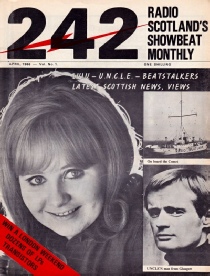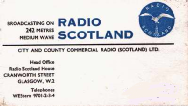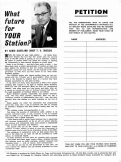© 2014-


Radio Scotland - History (2)
On 10th February 1966 Radio Scotland was forced to go off the air after the Comet shipped over five feet of water in heavy seas which were breaking across the vessel's bows. A distress message was sent out and a helicopter from RAF Leuchars was scrambled but due to the appalling weather conditions had to return to base before reaching the radio ship. The Dunbar lifeboat was then launched and after battling through heavy seas eventually reached the Comet, to deliver a heavy duty bilge pump. This equipment enabled the radio ship's crew to clear the flooded compartment, and Radio Scotland was able to return to the air.
Radio Scotland launched its own fan club - DJs. The Clan, which was similar to Radio London’s Big L Club and the Caroline Club, was managed by Cathy Spence, a former beauty queen, and produced promotional items for the station such as car stickers, DJ photos, pens and pin badges.
DJs. The Clan, which was similar to Radio London’s Big L Club and the Caroline Club, was managed by Cathy Spence, a former beauty queen, and produced promotional items for the station such as car stickers, DJ photos, pens and pin badges.
In April 1966 Radio Scotland launched its own magazine -
Radio Scotland itself meanwhile was still experiencing difficulties in achieving a satisfactory signal output to the west of the country so, at the end of April 1966, the station’s management decided to tow the Comet around the north of the country to a new anchorage on the west coast, near the holiday resort of Troon. The station had planned to continue broadcasting throughout the 1,000 mile, month long voyage, but this idea had to be dropped because of a number of problems encountered on the Comet , including a fire which put one of the ship's main generators out of action.The Comet did eventually arrive off the west coast and from its new anchorage position Radio Scotland was able to provide a much better signal to Glasgow and the west of Scotland.
The Bill to outlaw offshore broadcasting stations -
The initial reactions from the offshore stations to the Bill were defiant, containing general expressions of determination to fight its introduction and continue broadcasting. Radio Scotland claimed to have a plan to continue broadcasting by supplying the Comet from Ireland, moving its anchorage 70 miles out into the Atlantic, installing a more powerful transmitter and replacing the Scottish crew and DJs with foreign staff. The station organised a petition and within a month two and a half million signatures had been collected.
In March 1967 (before the Marine etc Broadcasting (Offences) Bill had become law) Radio Scotland found itself in court for allegedly broadcasting within British territorial waters. It was the choice of anchorage after the move to the west coast and the application of the Territorial Waters Order in Council of 1964 relating to the definition of what constitutes a bay that led to the prosecution.
The case was heard on 13th March 1967 at Ayr Sherriff's Court where the prosecution alleged that Radio Scotland had used a radio transmitter without a licence. Post Office engineers had monitored Radio Scotland's broadcasts from three positions on the Ayrshire coast and plotted the position of its vessel, under the terms of the 1964 Order in Council, as being at least 35 miles inside territorial waters. Radio Scotland's Defence Solicitor stated that the owners had honestly believed that they were operating in international waters as the ship was moored six and a half miles from the nearest coastline. 
City and County Commercial Radio (Scotland) Ltd., which pleaded guilty to the charge was fined £80. Following this prosecution the station left the air while preparations were made to tow the Comet back to Scotland's east coast. However, bad weather caused a cancellation of the planned five day tow and the ship was forced to lay silently at anchor off Troon for two weeks with only one DJ and a skeleton crew on board. During gales at the beginning of April 1967 the Comet broke from her anchor and was only saved from drifting ashore by a tug which towed the radio ship up and down Kames Bay, Rothesay for two days until an emergency anchor had been lowered.
All this time Radio Scotland was off the air and losing advertising revenue. The station's board of directors decided that something had to be done urgently to put the station back on the air so on 7th April 1967 the Comet was towed to a position off Ballywalter, Northern Ireland. From here transmissions started at 12.30pm the next day under the call sign Radio Scotland and Ireland. The station's name was also briefly changed to Radio 242.

Radio Scotland published its own monthly magazine for listeners -

Click on picture to enlarge

Radio Scotland’s petition against the Marine Offences Bill, published in 242 Magazine
242 Clan promo

Test transmission and request for reception reports when the Comet anchored off Troon

Radio Scotland’s anti-

Dropping anchor off Ballywater

Radio Scotland and Ireland opening announcement, Mel Howard, April 1967

Showbeat Monthly



Tiffin Bar



Lees Chocolate Snowball



For more about Radio Scotland visit
In the Special Exhibitions Gallery on the Ground Floor


Glasgow Herald
11th October 1966
History
Key Dates
Ship and Location
Technical
Staff
Programmes






Treasure Chest


Glasgow Herald
14th March 1967




Back to Britain Gallery


Back to Radio Scotland
